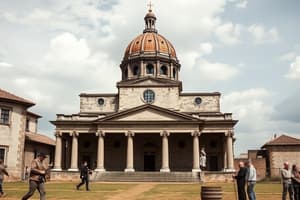Podcast
Questions and Answers
What defines a primary source?
What defines a primary source?
- A source that summarizes ideas from multiple authors.
- A source that interprets data from secondary sources.
- A collection of analyzed historical documents.
- A source produced at the same time as the event being studied. (correct)
Which of the following is NOT an example of a primary source?
Which of the following is NOT an example of a primary source?
- A legal document from the time.
- A biography of a historical figure. (correct)
- An artwork created during the era.
- A diary entry from a soldier.
What is the primary focus of external criticism?
What is the primary focus of external criticism?
- Analyzing the content for factual accuracy.
- Assessing the biases of the author.
- Verifying the authenticity of the evidence. (correct)
- Understanding the historical context of an event.
Which statement best describes internal criticism?
Which statement best describes internal criticism?
What does the Greek word 'historia' mean?
What does the Greek word 'historia' mean?
Which of the following would be considered a secondary source?
Which of the following would be considered a secondary source?
How does external criticism differ from internal criticism?
How does external criticism differ from internal criticism?
What is historiography primarily concerned with?
What is historiography primarily concerned with?
Which item is a primary source typically analyzed in historical research?
Which item is a primary source typically analyzed in historical research?
Which of the following is NOT a reason to study history?
Which of the following is NOT a reason to study history?
What type of source is typically created after the events have occurred?
What type of source is typically created after the events have occurred?
Which role has history NOT played in the past?
Which role has history NOT played in the past?
What is the primary focus of positivism as a school of thought?
What is the primary focus of positivism as a school of thought?
What aspect of history is emphasized in the learning objectives?
What aspect of history is emphasized in the learning objectives?
Which of the following statements reflects a common argument for appreciating history?
Which of the following statements reflects a common argument for appreciating history?
How does history contribute to a sense of collective identity?
How does history contribute to a sense of collective identity?
What does the phrase 'no document no history' imply in historical research?
What does the phrase 'no document no history' imply in historical research?
Which aspect is a primary focus of postcolonial history?
Which aspect is a primary focus of postcolonial history?
What is one of the main critiques of traditional historical methodology?
What is one of the main critiques of traditional historical methodology?
The Annales School of History primarily shifted focus from which of the following?
The Annales School of History primarily shifted focus from which of the following?
What is a key characteristic of historians aligned with the positivist approach?
What is a key characteristic of historians aligned with the positivist approach?
What does 'history from below' emphasize in historical studies?
What does 'history from below' emphasize in historical studies?
Which question illustrates a challenge in studying history objectively?
Which question illustrates a challenge in studying history objectively?
What is one of the goals of postcolonial historians?
What is one of the goals of postcolonial historians?
What does the Pantayong Pananaw emphasize in understanding Philippine history?
What does the Pantayong Pananaw emphasize in understanding Philippine history?
How does Ambeth Ocampo define the role of history?
How does Ambeth Ocampo define the role of history?
What does the Bipartite View of Philippine History represent?
What does the Bipartite View of Philippine History represent?
In the Tripartite View of Philippine History, what does 'Liwanag' symbolize?
In the Tripartite View of Philippine History, what does 'Liwanag' symbolize?
Which metaphor is used to describe precolonial Philippines in colonial narratives?
Which metaphor is used to describe precolonial Philippines in colonial narratives?
What is one of the claimed outcomes of 300 years of Spanish rule according to the Tripartite View?
What is one of the claimed outcomes of 300 years of Spanish rule according to the Tripartite View?
Which concept challenges the historical biases imposed by colonial narratives?
Which concept challenges the historical biases imposed by colonial narratives?
What does the conclusion about history imply?
What does the conclusion about history imply?
Flashcards are hidden until you start studying
Study Notes
Introduction to History
- History, derived from the Greek “historia,” means knowledge acquired through inquiry.
- It studies past events and their causes and significance, encompassing various interpretations.
- The discipline helps foster national unity, legitimizes regimes, and forges collective identity.
Importance of Studying History
- Understanding the past enriches comprehension of the present.
- It develops a sense of nationalism and awareness of social relationships.
- Appreciates cultural heritage and identity, broadens perspectives, and enhances critical thinking skills.
Historical Methodology and Philosophy
- Positivism emerged in the 18th-19th centuries, emphasizing empirical evidence for claims.
- The principle “no document, no history” underscores the importance of primary sources in historical research.
- Postcolonialism, developing in the 20th century, focuses on identity formation in formerly colonized nations and critiques colonial narratives.
Historical Methodological Techniques
- Historians utilize specific techniques to analyze sources and evidence.
- Conflicting accounts are reconciled with established rules; eyewitness and oral sources are treated as valid evidence.
The Annales School of History
- Originating in France, this school shifted focus from political history to social history and long-term trends.
- Advocated for documenting the lives of common people and classes overlooked in traditional historical narratives.
Types of Historical Sources
- Primary Sources: Created contemporaneously with the events; include letters, diaries, photographs, legal documents, and oral histories.
- Secondary Sources: Produce interpretations or analyses of primary sources; include biographies, documentaries, and scholarly articles.
Criticism in Historical Research
- External Criticism: Examines the authenticity of evidence based on physical characteristics and historical context.
- Internal Criticism: Analyzes the truthfulness of content, considering the author's background, agenda, and context.
Philippine Historiography
- Emphasizes inclusivity and complexities of historical narratives, confronting biases in historical accounts.
- Pantayong Pananaw: Advocates for internal discourse among Filipinos in understanding their own history.
- Challenges Western-centric views and promotes indigenous perspectives in historical retelling.
Views of Philippine History
- Bipartite View: Colonialism viewed through a lens of darkness (backwardness) and light (civilization), suggesting pre-colonial Philippines lacked civilization.
- Tripartite View: Portrays early Filipinos’ advanced civilization disrupted by colonialism, with aspirations for postcolonial recovery.
Conclusion on History
- History remains an evolving field with unfulfilled roles and cannot offer absolute truths.
- It requires continuous exploration and reinterpretation to fill gaps and challenge biases.
Studying That Suits You
Use AI to generate personalized quizzes and flashcards to suit your learning preferences.




